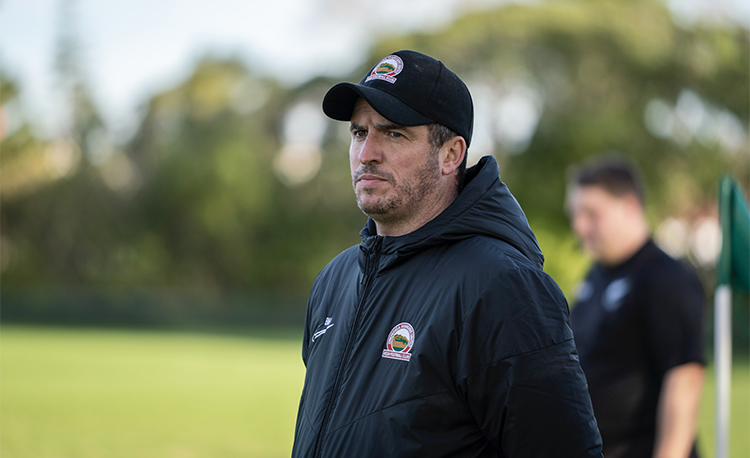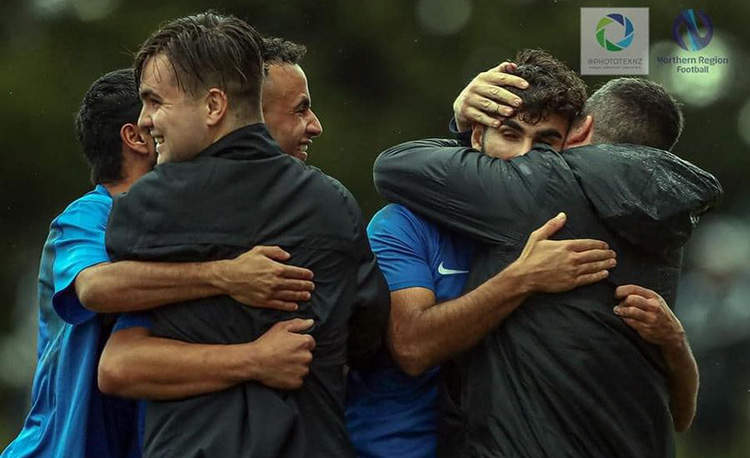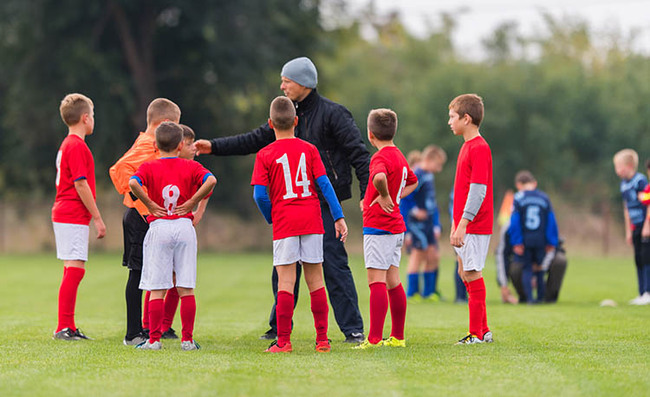Brian Murphy: From 'a dark place' to leading a club culture
In 2019, Brian Murphy was at his lowest ebb with depression - now he helps players when they come to him. He discusses his story with Steph Fairbairn
Brian Murphy wants people in soccer to open up more frequently about their mental health.
The Irish-born, Australia-based coach freely admits he had such a bad year in 2019, battling depression, that he tried taking his own life.
"I felt like a failure again," Murphy says, candidly.
"I went to a really dark place. I have a beautiful wife and two beautiful kids. It was a tough time for me and them.
"A friend of mine, Brian Shelley, reached out and brought me back into football as an assistant coach, for the rest of that season."
Following his recovery from that period, Murphy has most recently taken on his first role as head coach of a professional side, Magpies Crusaders United in Queensland.
He is taking all he has learned over the years - in good times and bad - to lead a team built on strong values and humility.
SCW caught up with Brian to discuss these values, how he goes about sharing his personal experiences with his players, and why he encourages them to hold themselves accountable…
SCW: We really appreciate you sharing your mental health story. It’s so important in the game that we’re speaking about that, isn’t it?
BM: "100%. I think a lot of players suffer with it and don’t know how to speak about it. I have been quite vocal about [there being] not enough being done by FAs and federations.
"It needs to be coming from the top within each nation. I think New Zealand are at the forefront with it with Dom Vettise, the sports psychologist I work closely with.
“Clubs are starting to get it right now. I think it needs to be really focused on the youth set up and what happens to the 18- and 19-year-olds that leave the system. "I think there needs to some sort of database or focus on seeing where they go and what their journey is like, so that can be improved along the way.”
SCW: Soccer has traditionally been a sport with a lot of pressure, where you can’t afford to make mistakes. I think we’re now more accepting that people do learn and grow. Is that the way you see it and the way you like to coach?
BM: "I’ve been a bit tough on the players over the last week - that’s not the coach I want to be.
"Having good values and surrounding yourself with good people is key..."
"I had to step back, look at myself in the mirror and say am I really living by my values? Are the players living by their values? How can we walk through this process?
"It’s tough, it’s a rollercoaster, it’s up and down - one minute you’re on a high, the next week, you’re on a low, we all know that.
“It’s very important you stay humble and grounded. I think having good values and surrounding yourself with good people is key.
"Just one person who takes an interest in you can change your life - it takes one person to believe in you.
"I talk to my players a lot. I notice when they’ve had a tough day at work and I try to get them to communicate that as well.
"A lot of the players, even though they’re professional, choose to work during the day as well. So they’re coming off long shifts and they’re trying to fit in family time as well.
"They’re going to make mistakes as a result. They’re going to be tired, they’re not going to be as focused. It’s all about clear communication.”
SCW: You mentioned values - how would you define your value set as a coach?
BR: "Firstly, when I sign players, I ask them about their background. It’s all about being a good person, so you’ll respect everybody in the changing room.
"Nothing is given - you’ve got to work hard for everything, so have a good work ethic, and be willing to learn and be open-minded.
“As a player, when I got to England, I thought ’I’m here now’. I stopped trying and my work ethic went the other way.
"If I’d kept the same work ethic, I probably would have had a decent career and could have played in League 2 [fourth tier], League 1 [third tier], Championship [second tier] or even, if I was lucky, the Premier League.
"But I know where I went wrong. I didn’t have the mental capacity for it. I didn’t know how to control my emotions. I didn’t have anyone to speak to about that sort of thing.
"The littlest thing would wind me up. I’d prove myself in the reserves or I’d go and bang in a hat-trick for the first team and the next week I’d be on the bench. Coaches didn’t really communicate back then and, for me, being a good communicator is the key.
“If you model your values, they’ll rub off on the players. [In] the last few weeks, I haven’t been doing that and I had to correct myself
"Rather than looking at the future - What’s next? Where do we go from here? - be more present in the moment. Stop looking at other coaches and what they’re achieving and what they’re doing.
“I got a sports psychologist and we started to work it out. He said ’If you were baking a cake, and the icing is the top, what are the ingredients that go into that?’.
"Courage is one. I talk to my players about courage - showing up even when things are going against us, having courage to take a chance, or make a tackle or work back.
"We speak about fear as well. It can be a good thing; it can also be a bad thing. Some players need fear to play.
“[Former English pro turned ’Fear Coach’] Drewe Broughton talks about mental health and empathy and that’s something I’ve been working on with the players, because they question ’why isn’t he training?’ when there are things going on in people’s lives that we don’t know about.
“We need to be open to the idea that players are going to need nights off, or are going to turn up and not be in the best mood and it’s not going to be personal.
"We need to look at things not through our eyes sometimes, but through theirs. Empathy, being humble and being a good communicator are all things that I try to reflect on my players."
SCW: How much do you talk to your players about your journey and what you learned?
BM: "A lot. I emphasise culture a lot, because it’s something we’re still building at the club, which is five years old.
"We got Dom Vettise to come in and speak to the players about what culture looks like and what our values are.
"Some players have opened up to me about their mental health difficulties..."
“I’ve been open about my experience and some players have actually opened up to me about their mental health difficulties they’re going through in life. That tells me a little bit about them and what frame of mind they are going into games with.
"We’ve got the players to come up with some values they are going to live by. The statement they came up with was: ’Together, we are strong, alone we are weak. Empathy is key, as brothers we can achieve anything’.
"I thought that was quite nice. I didn’t attend that meeting with the players, I let them get ownership of that."
Related Files
SCW: You mentioned accountability before. How important is it that the players doing it among themselves and it’s not just you that’s holding them accountable?
BM: "“I think it’s very important, holding each other accountable when a mistake is made. We know we’re going to make mistakes, we’re going to learn from them and we’re going to grow from them.
"No-one goes on to the pitch to make mistakes, but ask them what they saw at the time and the place. Could they have made that tackle?
“Some players will react to a bit of a kick up the backside and some players need an arm around them. It helps players learn about how each one of them works.
"When the chips are down, who’s going to get up and fight and drag the team along?
"The players start to identify who they can get on the back of to push them harder, or who they need to encourage and praise, to get better results."
Newsletter Sign Up
Coaches Testimonials

Gerald Kearney, Downtown Las Vegas Soccer Club

Paul Butler, Florida, USA

Rick Shields, Springboro, USA

Tony Green, Pierrefonds Titans, Quebec, Canada
Subscribe Today
Discover the simple way to become a more effective, more successful soccer coach
In a recent survey 89% of subscribers said Soccer Coach Weekly makes them more confident, 91% said Soccer Coach Weekly makes them a more effective coach and 93% said Soccer Coach Weekly makes them more inspired.
*includes 3 coaching manuals
Get Weekly Inspiration
All the latest techniques and approaches
Soccer Coach Weekly offers proven and easy to use soccer drills, coaching sessions, practice plans, small-sided games, warm-ups, training tips and advice.
We've been at the cutting edge of soccer coaching since we launched in 2007, creating resources for the grassroots youth coach, following best practice from around the world and insights from the professional game.








